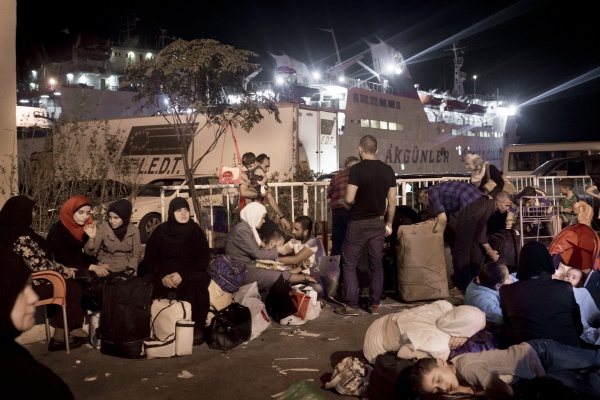Syrian Refugees are Quickly Running Out of Options
TNS
Syrian refugees at the port of Tripoli, Lebanon, waiting to board the ferry Lady Su, which travels to Tasucu, Turkey, in a twelve-hour journey. The ferry, which was scheduled to depart at 10 p.m. on September 21, left the port at 10 a.m. the following day due to regular delays and an truck accident during loading. (GAIA SQUARCI /MCCLATCHY/TNS)
September 22, 2015
The conditions of Syrian refugees around the world are the headlines of the news every day. In 2012, Syrian citizens began a revolt against the oppressive regime of president Bashar al-Assad. What began as peaceful protests turned into a bloody battle between rebels and the regime’s army. As time passed, the situation was aggravated by the interfering of other armed groups such as the Islamic State (ISIS). Violence, destruction and poverty dramatically altered the lives of Syrian citizens.
As the U.N and the Arab League were suggesting political solutions for the Syrian crisis, the number of refugees increased dramatically. According to Amnesty International, 4 million refugees from Syria are in just five countries: Turkey, Lebanon, Jordan, Iraq and Egypt. Only four out of the 22 Arab countries have offered the Syrian refugees all that they can, especially when taking into consideration each country’s economic struggles and political tensions. The rest of the Arab world, especially the Gulf countries, should take their responsibilities toward the Syrian refugees far more seriously. It is true that some Arab countries, such as Libya and Sudan, cannot offer asylum for Syrian refugees due to their own national issues that need to be solved, but the rest of the Arab world has not effectively reacted to the crisis.
All five of the countries that have so far opened their borders and offered asylum to Syrians have given the refugees everything within their means. However, the political, economic and geographic conditions of these five countries that already accepted refugees and saved their lives precludes them from offering any further aid. Egypt has suffered several terrorist attacks and violent protests, and there is a growing fear there of further terrorism and ISIS activities. The geographic capacity of Lebanon and Turkey, who both host almost 3 million refugees, limits their ability to accept anyone else. Iraq also hosts 249,000 Syrian refugees, and the turbulent condition of the country hinders its ability to provide the refugees safety or peace. And in Jordan, 80 percent of the refugees there live under the local poverty line.
In Europe, countries like England, Germany, France and Sweden are accepting asylum requests from Syrians, but this is a very lengthy and costly process that does not grant immediate relief. Meanwhile, while many Syrians simply have no place to go, the six countries of the Gulf Cooperation Council take in zero refugees. The Gulf countries, due to their economic and logistic capabilities, can ease the struggle of Syrian refugees if they simply open their borders for them.
The supporters of the Gulf Cooperation Council’s stance on keeping the borders closed claim that the number of refugees resulting from the Syrian crisis is too large. The political scientist AbdulKhaleq Abdulla from the United Arab Emirates (UAE) told Reuters that if the Gulf countries accept refugees, foreign workers will be more populous than actual citizens and then the citizens would be a minority in their own country. This concern is valid in an environment of normal international conditions, but with the catastrophic conditions that Syrian refugees face, this argument is unacceptable.
And the citizens of the Gulf countries agree. They feel ashamed of such arguments and excuses, for they think that their countries have a serious duty toward Syrians. They’ve created the hashtag #Welcoming_Syria’s_refugees_is_a_Gulf_duty to urge their governments to take in as many as possible. They agree that the interference of the Gulf countries in the crisis can save the lives of many Syrian refugees. Even though six Gulf countries provided some sort of aid to other countries where there are Syrian refugee camps, the crisis demands more than just money or food. There are millions of Syrians, not just in the refugee camps, that are looking for one thing: safety.
The international community must remember that Syrians are currently destitute. It is important to mention that in most of the countries that did or will offer asylum for Syrian refugees, the refugees live in either camps on the borders or in poor regions. Most of their children have been out of school for two years. These kids are forced to work to support their families. Even though UNICEF and many other humanitarian organizations provide the refugees with food, money and other supplies, barely anyone has offered them a respectable way of life.
The records indicate that there are 12.8 million people still inside Syria that are in urgent need of humanitarian help. Until the European countries process the asylum requests and the Gulf countries decide to play an effective role in the crisis, the suffering of the Syrian refugees is only going to increase. The crisis does not seem likely to be solved soon, and yet the international community observes the situation as if it is going to be solved by itself. It is true that the world is very vast, but in front of Syrians, the world has decided to turn its back on them.










